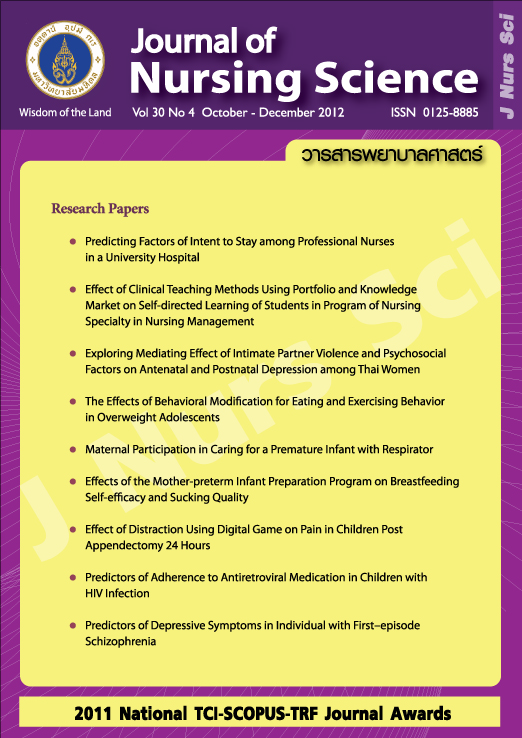Predictors of Depressive Symptoms in Individual with First–episode Schizophrenia
Main Article Content
Abstract
Purpose: To examine the predictive power of predictor variables: Cognitive Insight, Medication Adherences, and Social Support on depressive symptoms in individual with first-episode schizophrenia.
Design: Descriptive correlational study.
Methods: The sample consisted of 77 patients with first-episode schizophrenia who had a duration of illness of no more than five years since first diagnosis. The sample was selected by convenience sampling according to inclusion and exclusion criteria. The instruments included 1) The Beck Cognitive Insight Scale 2) The Medication Adherence Report Scale, 3) The Medical outcomes Study Social Support Survey, and 4) The Thai version of Calgary Depression Scale for Schizophrenia were analyzed using descriptive statistics and Multiple Linear Regression.
Main findings: The findings revealed that 75.32 % of the sample had depressive symptoms. Cognitive insight was found to be positively related to depressive symptoms to a high degree (r = .710, p < 0.01) and social support from families was negatively related to depressive symptoms (r = - .445, p < 0.01), while medication compliance was not related to depressive symptoms (r = 0.93, p > 0.05). These three factors altogether could 58.4 % of the variance in depressive symptoms in patient with firstepisodes schizophrenia (p < .001).
Conclusion and recommendations: The finding supported that, psychiatric nurses should promote the patients gained more cognitive insight, simultaneously, enhance the support of family members to prevent and reduce depressive symptoms in the patients with first-episode schizophrenia.
Keywords: cognitive insight, depressive symptoms, family support, medication adherence, schizophrenia
บทคัดย่อ
วัตถุประสงค์: งานวิจัยครั้งนี้มีวัตถุประสงค์เพื่อศึกษาอำนาจการทำนายของความเข้าใจการเจ็บป่วยทางจิต การให้ความร่วมมือในการรักษาด้วยยา และการสนับสนุนจากครอบครัวต่ออาการซึมเศร้าในผู้ป่วยจิตเภทที่มีอาการทางจิตครั้งแรก
รูปแบบการวิจัย: การวิจัยเชิงพรรณนาวิเคราะห์ความสัมพันธ์
วิธีดำเนินการวิจัย: กลุ่มตัวอย่างเป็นผู้ป่วยโรคจิตเภทโดยมีช่วงระยะเวลาการเจ็บป่วยไม่เกิน 5 ปี นับตั้งแต่วันที่ได้รับการวินิจฉัยจากจิตแพทย์จำนวน 77 ราย เลือกกลุ่มตัวอย่างแบบสะดวกตามเกณฑ์การคัดเข้าและคัดออก เครื่องมือที่ใช้ในการเก็บรวบรวมข้อมูลประกอบด้วย 1) แบบประเมินความเข้าใจการเจ็บป่วยทางจิต 2) แบบประเมินการให้ความร่วมมือในการรักษาด้วยยา 3) แบบประเมินเกี่ยวกับแหล่งสนับสนุนทางสังคม และ 4) แบบประเมินอาการซึมเศร้าในผู้ป่วยจิตเภท วิเคราะห์ข้อมูลโดยใช้สถิติบรรยาย และสถิติถดถอยพหุคูณ
ผลการวิจัย: ผลการวิจัยพบว่า กลุ่มตัวอย่างมีอาการซึมเศร้าร้อยละ 75.32 ความเข้าใจ การเจ็บป่วยทางจิตมีความสัมพันธ์ทางบวกกับอาการซึมเศร้าอย่างมีนัยสำคัญทางสถิติ (r = .710, p < 0.01) และการได้รับการสนับสนุนจากครอบครัวมีความสัมพันธ์ทางลบกับอาการซึมเศร้า อย่างมีนัยสำคัญทางสถิติ (r = - .445, p < 0.01) ส่วนการให้ความร่วมมือในการรักษาด้วยยาพบว่า มีความสัมพันธ์กับอาการซึมเศร้าอย่างไม่มีนัยสำคัญทางสถิติ (r = .093, p > 0.05) และพบว่า ทั้งสามตัวแปรสามารถร่วมกันอธิบายความแปรปรวนของอาการซึมเศร้าในผู้ป่วยจิตเภทที่มีอาการทางจิตครั้งแรกได้ร้อยละ 58.4 (p < .001)
สรุปและข้อเสนอแนะ: ข้อเสนอแนะจากผลการวิจัยคือ พยาบาลจิตเวชควรส่งเสริมให้ผู้ป่วยมีความเข้าใจการเจ็บป่วยทางจิตให้ถูกต้อง ในขณะเดียวกันควรส่งเสริมให้ผู้ป่วยได้รับการสนับสนุนทางสังคมจากครอบครัว เพื่อป้องกันและลดการเกิดอาการซึมเศร้าในผู้ป่วยโรคจิตเภทที่มีอาการทางจิตครั้งแรก
คำสำคัญ: ความเข้าใจการเจ็บป่วยทางจิต อาการซึมเศร้า การสนับสนุนจากครอบครัว การให้ความร่วมมือในการรักษาด้วยยา โรคจิตเภท
Article Details
Copyright Notice: Nursing Science Journal of Thailand has exclusive rights to publish and distribute the manuscript and all contents therein. Without the journal’s permission, the dissemination of the manuscript in another journal or online, and the reproduction of the manuscript for non-educational purpose are prohibited.

Disclaimer: The opinion expressed and figures provided in this journal, NSJT, are the sole responsibility of the authors. The editorial board bears no responsibility in this regard.

